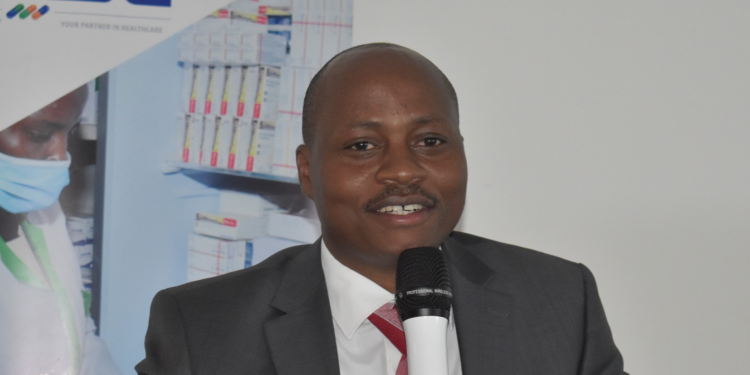Former Kenya Medical Supplies Authority (KEMSA) Chief Executive Officer Andrew Mulwa found himself on the defensive during a tense Senate session yesterday. The ex-CEO, grilled by lawyer Ndegwa Njiru representing Deputy President Rigathi Gachagua, struggled to substantiate claims of undue influence and bullying in a cross-examination that questioned his involvement and competence.
Njiru, representing Gachagua, wasted no time in grilling Mulwa, beginning by questioning his involvement in key tendering processes at KEMSA. Mulwa, who joined the organization in March 2023, admitted that the tender under scrutiny had already been terminated by the time he assumed office. Njiru seized upon this, pointing out that Mulwa was neither involved in the tender evaluation process nor witnessed any irregularities firsthand.
“You were not there during the tendering process, correct?” Njiru pressed.
“Correct,” Mulwa responded.
“So, the issues you are testifying about, are they things you witnessed or were told?” Njiru asked, clearly laying the groundwork to discredit Mulwa’s testimony.
Mulwa, under visible strain, admitted that he had neither seen nor been told of the alleged issues at the time the tender was being awarded, a critical point that weakened his credibility. Njiru methodically continued to dismantle the ex-CEO’s testimony, casting doubt on the very basis of his claims.
The tender in question, which had been canceled before Mulwa’s tenure began, was a key component of the cross-examination. Njiru pointed out that the tender had been terminated following a Global Fund review, which found inconsistencies in the evaluation process. None of the bidders, including a company allegedly linked to Gachagua, met the minimum requirements. Mulwa was forced to admit that the termination of the tender had nothing to do with the Deputy President and was purely based on technical evaluation issues.
“Was the Deputy President involved in the tender evaluation committee?” Njiru asked.
“No,” Mulwa replied reluctantly.
Despite the lack of direct evidence connecting Gachagua to the tender’s cancellation, Mulwa maintained that he had been bullied and intimidated by Gachagua. According to his testimony, Gachagua had allegedly pressured him in August 2023, months after the tender had already been canceled. Njiru pounced on this discrepancy, asking why Gachagua would intimidate him over a tender that was no longer active.
“When did the tender get canceled?” Njiru asked.
“In April,” Mulwa responded.
“And when did you claim the Deputy President called you?” Njiru inquired.
“In August,” Mulwa answered.
“At that time, was the tender still active?” Njiru continued.
“No, it had been canceled,” Mulwa said.
Njiru highlighted that it would be normal for companies involved in the tender process to follow up on the status of their bids, even after a cancellation. He pointed out that Mulwa had written to Shobikaa Impex, a company allegedly linked to Gachagua, informing them that their bid bond was under investigation by the Ethics and Anti-Corruption Commission (EACC), a routine process that did not violate any procurement laws.
The line of questioning shifted to Mulwa’s claims of bullying. In his evidence, Mulwa had provided WhatsApp messages between himself and a Dr. Ikinu, allegedly on Gachagua’s behalf. The messages, however, were vague, with Dr. Ikinu merely requesting Mulwa to contact him regarding a document.
“How did you feel intimidated by this message?” Njiru asked, incredulous.
“I received the message and I felt intimidated,” Mulwa replied, visibly struggling to justify his emotions.
Njiru then questioned the authenticity of the messages, pointing out that they lacked crucial details such as Mulwa’s phone number, raising the possibility that the messages were fabricated. Mulwa, however, insisted that the messages were genuine, but his explanation lacked the technical knowledge to back his claims.
“You confirm that this is not usual?” Njiru pressed, referring to the missing phone number.
“This is what is on my phone,” Mulwa responded weakly.
The session also delved into the broader context of KEMSA’s operational challenges during Mulwa’s tenure. A report by the Global Fund had criticized KEMSA for failing to maintain autonomy due to alleged interference from the Ministry of Health. However, when Njiru asked whether any interference had come directly from Gachagua, Mulwa admitted that he had not seen any evidence to suggest that the Deputy President was involved in KEMSA’s internal affairs.
Despite this, Mulwa continued to insist that he had been pressured by Gachagua, although his testimony lacked concrete evidence to support this claim. Njiru concluded his cross-examination by pointing out the discrepancies in Mulwa’s testimony, from the timing of the alleged bullying to the lack of direct involvement by Gachagua in the tendering process.


















